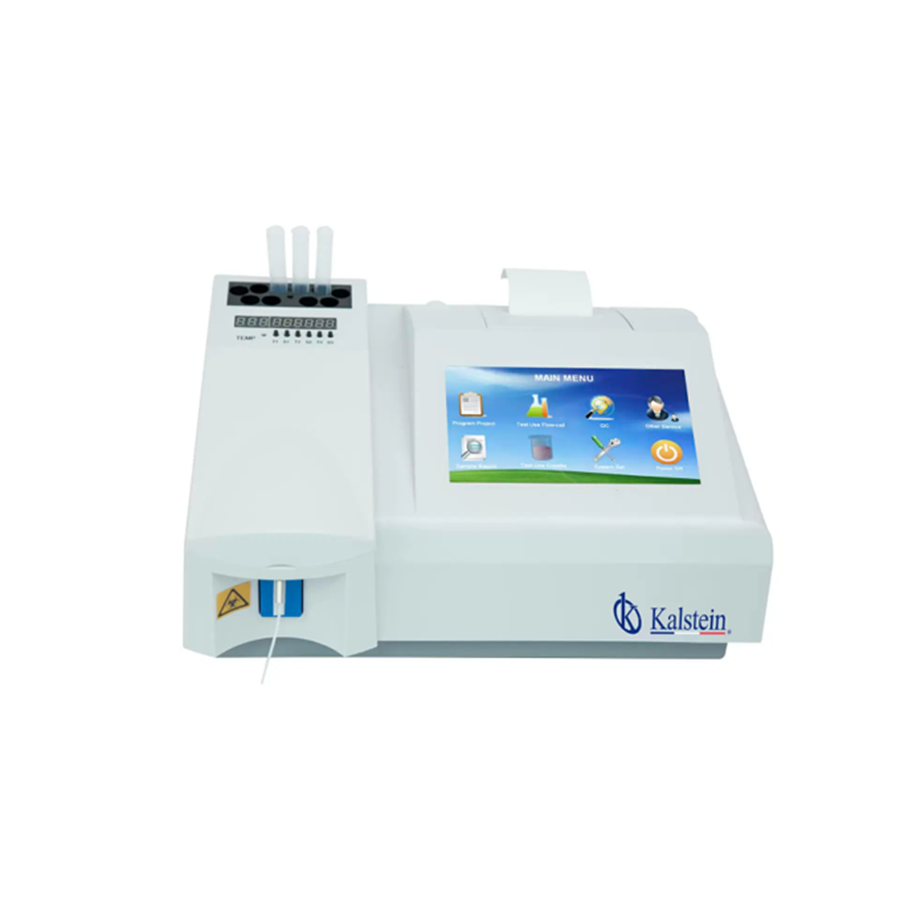When it comes to acquiring laboratory equipment, the scenario can seem a bit daunting due to the multiplicity of options available. To assist in this process, we have chosen two popular chemistry analyzers on the market: the Kalstein YR05115 and the Mindray BA88A. In the following write-up, we will break down the technical specifications and features of each of these devices, in order to equip potential buyers with the necessary information to make the choice most suited to their needs.
Both the Kalstein and the Mindray offer a 7-inch color touch LCD display, allowing intuitive and easy-read handling for operators. Nevertheless, Kalstein YR05115 has a slight advantage with its 10 incubators and three integrated timers, providing greater flexibility and control in equipment handling.
Test Types and Methods
Both analyzers perform tests in flow cell or cuvette, providing valuable versatility. Regarding the test method, Kalstein offers Kinetic, End Point, Two Point, and Absorbance, whereas Mindray includes End Point, Fixed Time, and Kinetic Methods. Kalstein YR05115 shows its advantage by having a wider range of test methods.
Kalstein YR05115 offers 7 standard filters, while Mindray BA88A has 6. This translates into the Kalstein manufacturer’s device offering a broader range, being capable of covering more analysis applications. As for absorbance accuracy, Kalstein YR05115 leads, providing an external accuracy of 0.0001 Abs and internal accuracy of 0.00001 Abs.
Storage Capacity and Dimensions
Kalstein YR05115 has a superior data storage capacity of ≥10000, surpassing Mindray with only 3000. Despite being more lightweight and compact, the Kalstein equipment does not compromise on quality and efficacy, facilitating its transport and optimizing workspace. https://kalstein.it/products/chemistry-analyzer-yr05115/
| ESPECIFICACIONES/MARCA | KALSTEIN (YR05115) Semi auto chemistry analyzer | Mindray BA88A Semi auto chemistry analyzer |
| Display | 7 inch Color LCD , Touch screen 10 incubators and three timers |
7.0 TFT touch-screen |
| Test mode | flowcell or cuvette | flowcell or cuvette |
| Test method | Kinetic, End point, Two point, Absorbance | end point, fixed-time, kinetics methods |
| Wavelength | 7 standard filters, 340, 405, 492, 510, 546, 578, 630 nm, 1 free position | 6 standard filters340, 405, 510, 546, 578, 630 nm |
| Wavelength precision | ±2 nm, width ≤ 10nm | |
| Absorbance range | 0~4.500 Abs | 0.0000 to 3.0000 ABS |
| Absorbance precision | outside 0.0001 Abs , inside 0.00001 Abs | |
| carry over | < 1% | |
| CV | < 1% | |
| Sample volume | 0~3000 uL (≥500uL recommend) | 200-9000 ul |
| Data Storage | ≥10000 | 3000 |
| Flow cell | 32 uL quartz glass, 10 mm | |
| Lamp | Philips 6V 10W Halogen Lamp with long life | 6V 10W Halogen Lamp |
| Printer | Built-in thermal printer | Built-in thermal printer |
| Dimension | 340(L)*270(W)*160(H) | 420(L)*350(W)*158(H) |
| Weight | 5 kg | 7kg |
Which is the best for your laboratory?
Considering the features, specifications, and price, it is clear that the Kalstein YR05115 chemistry analyzer offers more advantages compared to the Mindray BA88A. Its high precision, greater storage capacity, and wider wavelength range make this Kalstein device a smart investment for your laboratory.
The final purchase or sale decision should always be based on the specific needs of your laboratory. We hope that this comparative study has helped guide you towards an informed decision. Remember, it is always crucial to contact your trusted manufacturer for personalized advice.

